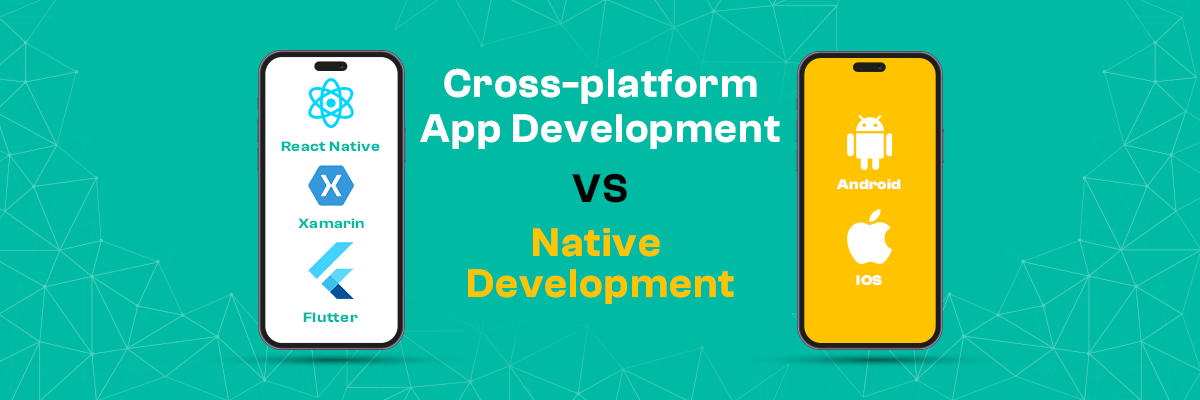Cross-platform app development vs Native app development

The days of solely relying on offline shops for business are over; now, you need an app to sell anything from software to food. According to data, 72% of customers show loyalty to a company with an app and are more likely to buy from it. So, if you’re going to build a big business starting today, you must get an app. But the question is – what kind? Cross-Platform or Native? Let’s answer that.
What is a Native app?
Applications that are designed specifically for a single operating system, such as iOS or Android OS, are referred to as native mobile applications. Therefore, you would choose native mobile app development, which entails coding the application in the required programming language of the operating system, both for business and customer needs. Programming languages like Java or Kotlin are used to create native apps for Android, while Objective-C or Swift are frequently used by developers to create native iOS applications. Some of the most well-known examples of native mobile apps, developed natively for iOS and Android, include WhatsApp, Spotify, Google Maps, and Pinterest.
What is a cross-platform app?
A single codebase is used to create a cross-platform mobile application, targeting multiple operating systems with a single development project. These mobile applications are developed using cross-platform frameworks that leverage a single API and platform-specific SDKs (iOS or Android). Because of this, cross-platform development is a popular option for creating mobile applications as it makes numerous libraries and SDKs easily accessible to developers. Among the most widely used cross-platform frameworks are JavaScript, used in Meta’s (formerly Facebook) creation of React Native, and Dart, used in Google’s Flutter. Based on these frameworks, many popular cross-platform mobile apps are available nowadays, including Instagram, Skype, Airbnb, etc.
Benefits of native apps
Now, let’s know how a native app can help you in your business.
1. Performance – Native apps are optimized for the platform’s hardware and software, resulting in faster performance and a smoother user experience compared to cross-platform alternatives.
2. User Experience – They provide a consistent and intuitive user experience by leveraging platform-specific UI components and design guidelines, leading to higher user satisfaction and engagement.
3. Access to Device Features – Native apps have full access to the device’s hardware features (such as camera, GPS, accelerometer) and software APIs, enabling developers to create rich and feature-packed applications.
4. Offline Functionality – Many native apps can function offline or with limited connectivity, allowing users to access content and perform tasks even when not connected to the internet.
5. Security – Native apps get benefits from the security updates and features provided by the platform, making them a more secure option compared to some cross-platform solutions.
6. Better Integration – These native apps can seamlessly integrate with other apps on the platform, offering enhanced interoperability and a smoother user experience.
7. App Store Optimization – Native apps can take advantage of platform-specific app stores (such as the Apple App Store or Google Play Store), which often offer better discoverability, distribution, and monetization opportunities.
Benefits of cross-platform apps
Now let’s jump into knowing the benefits of cross-platform apps too –
1. Cost-Effectiveness – Developing a cross-platform app requires writing and maintaining a single codebase, which can significantly reduce development costs compared to building separate native apps for each platform.
2. Faster Development Time – Cross-platform development frameworks (like React Native, Flutter, or Xamarin) enable faster development by allowing developers to reuse code, assets, and resources across multiple platforms.
3. Broader Reach – Cross-platform apps can reach a wider audience by targeting multiple platforms with a single codebase, potentially increasing the app’s user base and market share.
4. Consistent User Experience – Cross-platform frameworks often provide tools and components to ensure a consistent user experience across different platforms, maintaining brand identity and usability.
5. Simplified Maintenance – Since there’s only one codebase to maintain, updates, bug fixes, and feature enhancements can be implemented more efficiently, leading to lower maintenance costs and faster release cycles.
6. Easier Deployment – Deploying updates to cross-platform apps is simpler and faster, as changes can be pushed to all platforms simultaneously without the need for separate releases.
7. Access to Native Features – Many cross-platform frameworks provide access to native device features and APIs, allowing developers to leverage platform-specific capabilities while still maintaining a single codebase.
Conclusion
With both native and cross-platform apps having their kind of strengths to impact your business, you need to understand which goes well with your business vision and capabilities. But to develop any kind of these two apps for your business you can surely get in touch with Jet2 Travel Technologies.


